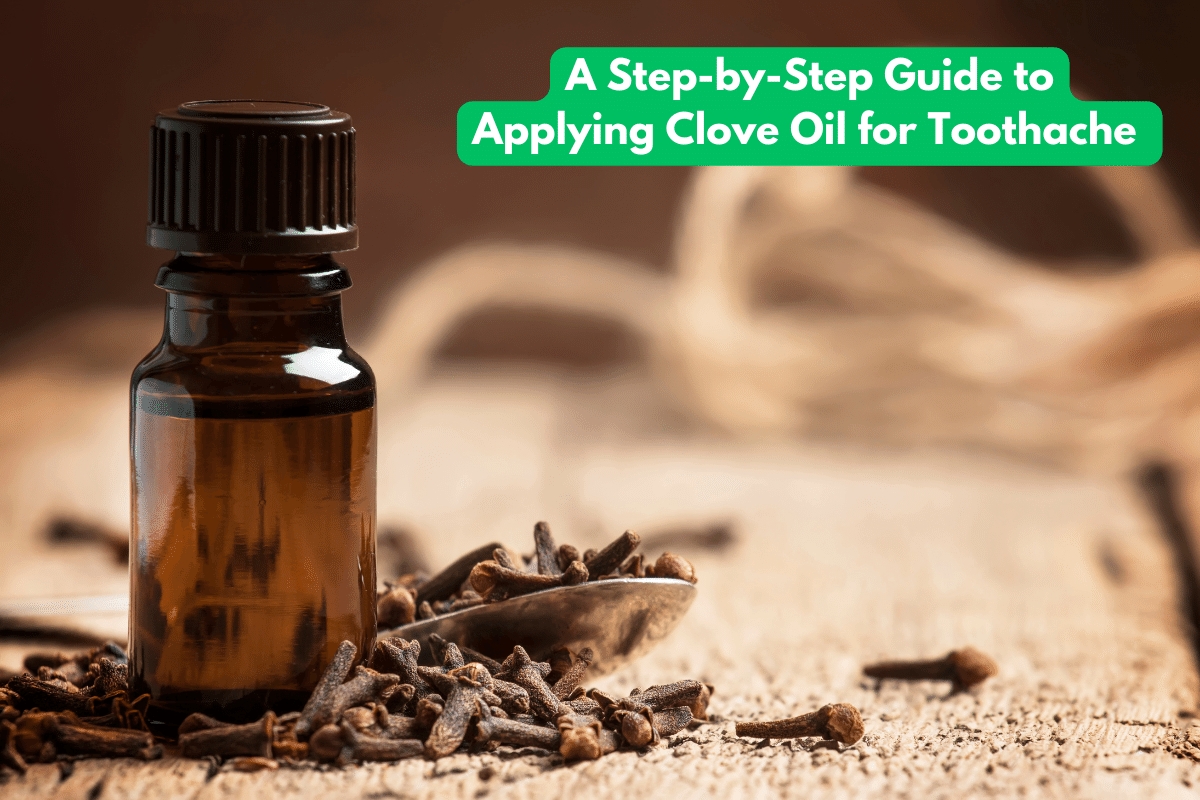A Step-by-Step Guide to Applying Clove Oil for Toothache

Clove oil is derived from the flower buds of clove three and it has been known for its amazing antimicrobial and anti-inflammatory properties. For the past so many years people have been using it as a natural remedy for dental pain management offering relief from toothaches and oral discomfort. In this guide you can explore the therapeutic benefits of clove oil. Clove oil is a compound known for its potent analgesic and antimicrobial and antibacterial properties. Natural remedies like clove oil have minimum side effects as compared to the pharmaceutical pain relievers making them a safe option for you if you have sensitivities or allergies. The natural remedies often gentler on your oral tissues and are least likely to cause irritation or damage to your gums, teeth or soft tissues of your mouth. Furthermore several natural remedies including clove oil are readily available and cost effective so you don't have to worry about anything.
Understanding Toothache Causes and Symptoms
Common Causes of Toothache:
Toothache can be caused due to different factors like tooth decay also known as cavities occurs when your bacteria in the mouth produces acids that erode the enamel . Gum disease can cause inflammation infection and gum recession leading to tooth pain and sensitivity. Dental infections in your tooth pulp or surrounding issues can cause severe toothache. Injury or trauma to your tooth like cracks or dislodgement can result in acute or chronic toothache depending on the extent of the damage
Symptoms Associated with Toothache generally include sharp or dull pain. It ranges anywhere between severe or throbbing. The pain might worsen with chewing or biting; it is impacted by decay cavities or dental infections might become sensitive towards hot or cold foods and beverages causing discomfort or pain upon contact. Dental infections might cause the formation of pus or discharge around the affected tooth indicating the presence of infection which requires instant treatment.
Benefits of Clove Oil for Toothache Relief
Analgesic Properties:
The clove oil is known for its analgesic properties all thanks to the high concentration of eugenol. It works like a natural aesthetic by numbering the areas in your affected area providing you temporary relief from toothache and discomfort. Just applying this oil topically to the affected tooth or gums can help you get rid of pain and promote comfort while awaiting professional dental care.
Antimicrobial Effects:
The clove oil exhibits potential antimicrobial properties that helps you fight bacteria and prevents infection in the mouth. Using this oil as a mouthwash or topical application can help you reduce the bacterial load, promote oral hygiene and support your overall oral health.
Anti-inflammatory Properties:
The clove oil possesses anti-inflammatory properties that help you reduce swelling and irritation in the gums and oral tissues. By inhibiting the inflammatory pathways and reducing the production of pro inflammatory properties. Oil can help you read off symptoms linked with toothache like gum inflammation and discomfort. So incorporating the clove oil into your oral care routines can promote oral health and soothe your oral tissues impacted by dental issues.
Purchasing and Preparing Clove Oil
Choosing High-Quality Clove Oil:
when buying the clove oil for toothache relief it's important for you to choose high quality pure and organic varieties. You need to look for oil which is 100% pure and free from additives, letters or synthetic ingredients. Your oil will have strong aromatic scent characteristics of clove. You can go for organic clove oil whenever possible to ensure you are getting the best as it is produced without the use of synthetic pesticides, herbicides or genetically modified organisms. Furthermore you must choose a reputable brand and manufacturer known for their commitment towards quality transparency and ethical sourcing to understand the quality and effectiveness of the product. The oil you choose must be packaged in dark colored glass bottles to protect the same from light exposure which can degrade the potency overtime. You must avoid purchasing clove oil in plastic bottles or containers as it can interact with oil and compromise the quality.
Dilution Ratios:
need to mix one to two drops of clove oil with one teaspoon of carrier oil like olive oil or coconut oil. The dilution ratio is suitable for most adults and provides a safe way to apply the oil topically. Before applying diluted clove oil to a larger area perform a patch test on the small area to check for any side effects. If irritation occurs, discontinue the use immediately. It is very important for you to store the diluted clove oil in a dark colored glass bottle and cool dry place away from direct sunlight and heat to preserve its freshness and potency
Methods of Applying Clove Oil for Toothache Relief
Direct Application:
clove oil offers effective relief from toothache when applied directly to your affected area. Direct application includes applying a small amount of undiluted oil directly to the affected tooth. You just need to dip a cotton swab or cotton ball into a small amount of oil and apply to the affected tooth and allow the cloth to absorb it into the tissues for several minutes before rinsing your mouth.
Oil Pulling Technique:
Oil pulling is an ancient Ayurvedic practice which includes swishing the oil around the mouth to promote oral hygiene . You just need to swish the oil around your mouth ensuring that the oil reaches all areas. You'd need to continue it for around 10 to 15 minutes then spit it out in the trash can
Mouth Rinse:
You need to dilute the oil in water to create a mouth rinse and it is an effective method for getting rid of toothache. You just need to add 2 to 3 drops of clove oil in the water and stir well to mix. You can use the solution as a mouth rinse and swish it around your mouth for 60 seconds and then spit it out into the sink or trash can
Step-by-Step Guide to Applying Clove Oil
- Preparing the Area: Before applying the oil it's important for you to rinse the mouth with warm water. Take a sip of warm water and swish it around your mouth for 30 to 60 seconds and spit it into the sink or trash can. You can repeat the rinsing process if important until your mouth feels clean and refreshed.
- Diluting Clove Oil (if necessary) and Applying to the Affected Tooth or Gum- If using undiluted clove oil consider diluting it to reduce the risk of irritation you just need to add 1 or two drops of clove oil to the carrier oil like olive oil or coconut oil and mix it well you can dip a cotton swab into the diluted solution and gently apply the affected tooth.
- Holding the Oil in Place for Several Minutes to Allow Absorption after applying close all to the affected area it's important for you to allow it to absorb into the tissues for several minutes to maximize the effectiveness. You need to keep your mouth closed and avoid talking or eating while the oil is in place. You just need to hold the swab against the affected gums applying metal pressure to ensure contact with the oil.
Precautions and Safety Tips
- Avoiding Direct Contact with the Gums for Prolonged Periods- No doubt oil can provide you effective relief from toothache but you need to avoid contact with the gums for a long time to prevent irritation. Avoid leaving the clove oil in direct contact with the gums for a long time just apply it to the affected areas. The clove oil is print and can cause irritation if used excessively or applied directly to the gums. You need to use it sparingly and discontinue the use of irritation. If you experience any side effects about using the oil consult with a dentist or a healthcare expert.
- Not Ingesting Clove Oil: Spit Out Excess Oil After Application You must know that the oil is just for external use and you should not ingest it. After applying it you can spit out the excessive clove oil into the sink . You should rinse your mouth thoroughly with warm water to remove any remaining traces of plow oil and swish the water around your mouth for 30 to 60 seconds and then spit it out. You can repeat the rinsing process if important until the taste and scent of clove oil has dissipated.
- Conducting a Patch Test: Before applying the clove oil to the affected tooth or gums it's important for you to conduct a patch test. You need to dilute a small amount of clove oil with a carrier oil and wait 24 hours and observe the area for any signs of redness or itching. If you experience any side effects like rash or discomfort you should not use the oil and seek alternative remedies.
Additional Tips for Toothache Relief
- Maintaining Good Oral Hygiene Practices: besides using clove oil for toothache you should also maintain good oral hygiene practices to prevent dental issues and promote overall oral health. You must brush your teeth at least twice a day using fluoride toothpaste. You must floss between your teeth once a day to remove the plaque and debris that your toothbrush might miss. It's vital for you to rinse your mouth with an antimicrobial mouthwash to kill the bacteria and freshen your breath. Additionally it's really important for you to schedule a regular dental checkup and cleanings with your dentist to monitor the oral health and detect any dental issues in time.
- Seeking Professional Dental Care for Persistent or Severe Toothache - if you experience severe or persistent toothache that does not respond to home remedies you need to seek immediate dental care. Swelling redness that inflammation in your gums or oral tissues might indicate an underlying infection. If 2 take persists makes it difficult for you to eat, drink or perform daily activities it's time for you to seek a dentist evaluation and treatment.
When to Consult a Dentist
- Signs and Symptoms That Require Immediate Dental Attention-no doubt the clove oil can provide you temporary relief from toothache but some signs and symptoms warrant immediate dental attention. If you experience severe or persistent tooth pain that does not improve with home remedies you need to connect with your dentist as soon as possible. Fever chills or general feelings of illness accompanied by the toothache indicate infection that requires prompt treatment to prevent complications
- Importance of Seeking Professional Diagnosis and Treatment for Dental Issues-dentists can perform thorough examination including dental X-rays for accurate diagnosis. They can provide you with complaints or treatment for dental issues including dental fillings, root canal therapy and other procedures to address the root cause of the toothache and restore the oral health. They can also provide you guidance and support for maintaining long term oral health including preventive care and oral hygiene instructions to prevent future problems.
So above all you need to know that clove oil is a natural remedy that offers you effective relief from toothache discomfort thanks to the analgesic antimicrobial and antibacterial properties. By applying clove oil directly to the affected tooth or gums using it as a mouth rinse can get help you get rid of pain and reduce inflammation. But it's important for you to use the clove oil with caution and follow all the safety steps.











